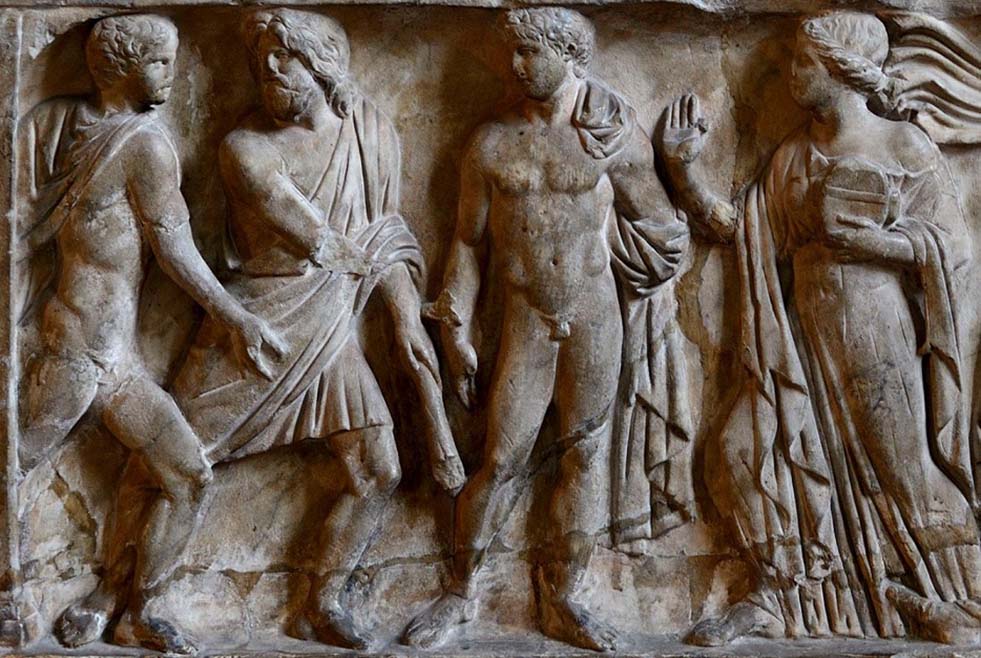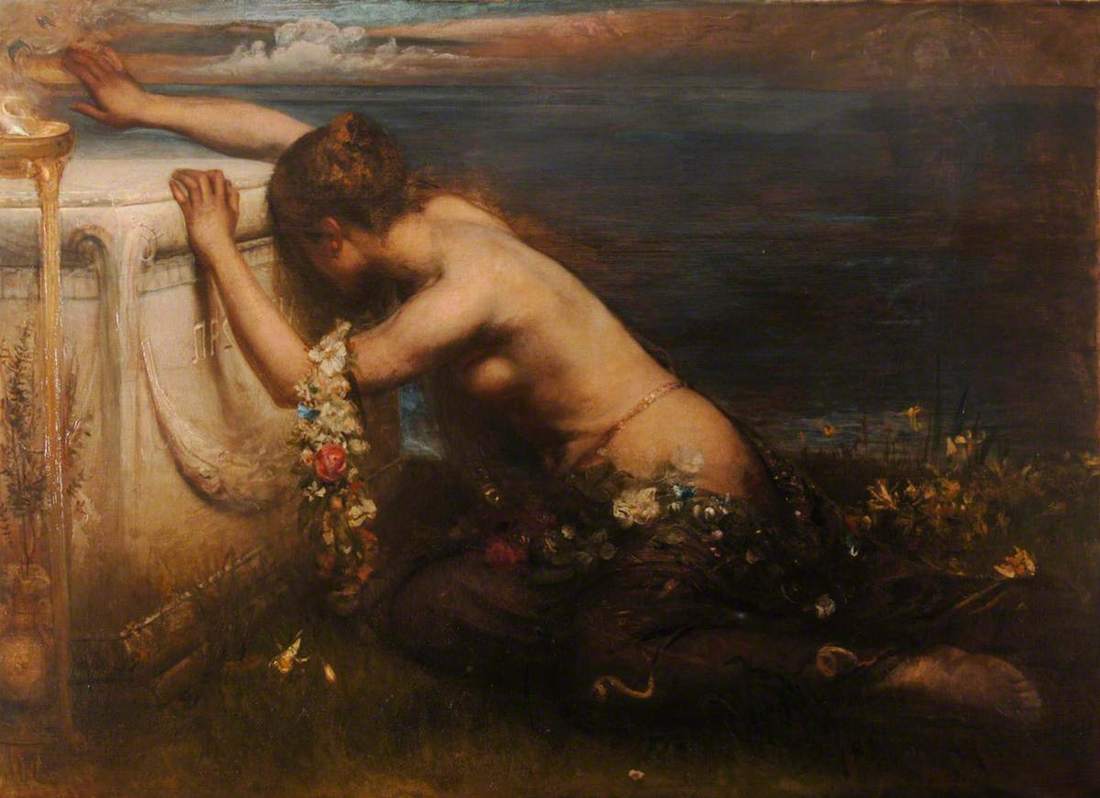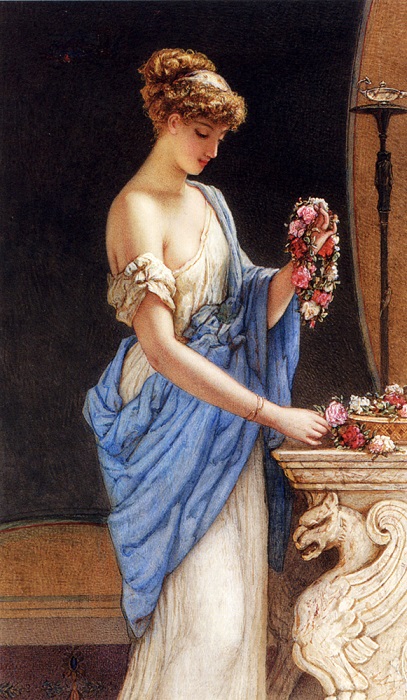Laodamia
Laodamia of Phylace
In Greek mythology, Laodamia (Ancient Greek: Λαοδάμεια) was the daughter of Acastus and Astydameia, who became the wife of Protesilaus.
In this story we have a marriage between the son and daughter of two Argonauts.
On the one hand, Laodamia was the daughter of King Acastus of Iolcus, and Acastus’ wife, Astydameia. Acastus was the son of Pelias, and one of the Argonauts, whilst Astydameia was a woman infatuated with the Greek hero Peleus.
On the other hand, when of age Laodamia would marry Protesilaus, the son of Iphiclus, another Arognaut; Protesilaus was also grandson of Phylacos, the founder of Phylace. Some tell of Protesilaus’ wife being not Laodamia though, but rather Polydora, daughter of Meleager (Stasinus, Cypria epic poem).
Previous to the marriage with Laodamia though, Protesilaus had been one of those who had vied for the hand of Helen, and was thus bound by the Oath of Tyndareus, to protect Menelaus, the chosen husband of Helen.
The Oath of Tyndareus meant that that Protesilaus was duty bound to lead the Phylaceans to Troy, and when Protesilaus was the first to set foot upon the Troad, a prophecy came true, for Protesilaus was the first of the Achaean heroes to die during the Trojan War.
News of the death of Protesilaus would eventually reach Laodamia, who was naturally overcome by grief. The gods observed Laodamia’s loss, and Hermes was instructed to bring Protesilaus back from the underworld, but only for three hours; and so, Laodamia and Protesilaus were joined once more.
The three hours were soon over though, and Hermes would return Protesilaus to the realm of Hades once again. Grief returned to Laodamia, and so overwhelming was it, that Laodamia was said to have committed suicide, stabbing herself.
According to Hyginus' Fabulae (104), however, the story runs like this: "When Laodamia, daughter of Acastus, after her husband's loss had spent the three hours which she had asked from the gods, she could not endure her weeping and grief. And so she made a bronze likeness of her husband Protesilaus, put it in her room under pretense of sacred rites, and devoted herself to it.
When a servant early in the morning had brought fruit for the offerings, he looked through a crack in the door and saw her holding the image of Protesilaus in her embrace and kissing it. Thinking she had a lover he told her father Acastus. When he came and burst into the room, he saw the statue of Protesilaus. To put an end to her torture he had the statue and the sacred offerings burned on a pyre he had made, but Laodamia, not enduring her grief, threw herself on it and was burned to death."

Laodamia in Greek Mythology
Overall, in Greek mythology, the name Laodamia (Ancient Greek: Λαοδάμεια) referred to:
Laodamia (or Hippodamia), daughter of Bellerophon and Philonoe, sister of Hippolochus and Isander and the mother of Sarpedon by Zeus. She was shot by Artemis (that is, died a sudden, instant death) one day when she was weaving. Diodorus Siculus called her Deidamia, the wife of Evander, who was a son of Sarpedon the elder and by her father of Sarpedon the younger. Xanthus was also called the father of Sarpedon according to one account.
Laodamia, daughter of Acastus and Astydameia and the wife of Protesilaus. When her husband fell in the Trojan War, Laodamia committed suicide rather than be without him.
Laodamia or Leaneira, an Arcadian queen as the wife of King Arcas by whom she became the mother of Elatus, Apheidas and Triphylus. Laodamia was the daughter of King Amyclas of Sparta and Diomede, daughter of Lapithes. Through this parentage, she was considered the sister of Argalus, Cynortes, Hyacinthus, Polyboea and, in other versions, of Daphne.
Laodamia, daughter of Alcmaeon, wife of Peleus and mother by him of Polydora. But see Antigone (daughter of Eurytion).
Laodamia, wife of Anticlus. Her husband was one of the men who were hiding in the Trojan Horse.
Laodamia or Laodice, alternate name for Iphthime, daughter of Icarius of Sparta and Asterodia, daughter of Eurypylus. She was the sister of Amasichus, Phalereus, Thoon, Pheremmelias and Perilaos.
Laodamia or Arsinoe, nurse of Orestes. She saved his life by sending him to Strophius after the murder of Agamemnon, whereas Aegisthus killed her own son, taking him for Orestes.
Laodamia, alternate name for Hippodamia (wife of Pirithous) occurring in a red-figure vase painting.

Sources
Pseudo-Clement, Recognitions 10.21
Homer, Iliad 6.197-205
Bibliotheca, Epitome of Book IV, 3. 30
Ovid, Heroides, 13
Hyginus' Fabulae 104
Diodorus Siculus, Bibliotheca historica 5.79.3
Dictys Cretensis. Trojan War Chronicle, 2.11
Pseudo-Apollodorus, Bibliotheca, Epitome of Book 4, 3. 30
Ovid, Heroides 13
Hyginus, Fabulae 104
Pseudo-Apollodorus, Bibliotheca 3.9.1
Pausanias, Graeciae Descriptio 10.9.5
Pausanias, Graeciae Descriptio 3.1.3
Pseudo-Apollodorus, Bibliotheca 3.10.3
Pausanias, Graeciae Descriptio 3.19.4
Parthenius, Erotica Pathemata 15
Scholia on Homer, Iliad, 2. 684
Tryphiodorus, The Taking of Ilios, 475
Pseudo-Apollodorus, Bibliotheca, Epitome of Book 4, 5.19
Scholia on Homer, Odyssey 4.797
Scholia on Homer, Odyssey 1.275-277
Scholia on Aeschylus, Libation-Bearers, 714 (729)
Pindar, Pythian Ode 11.25 with scholia
"Wikipedia"
"Greek Legends and Myths"













